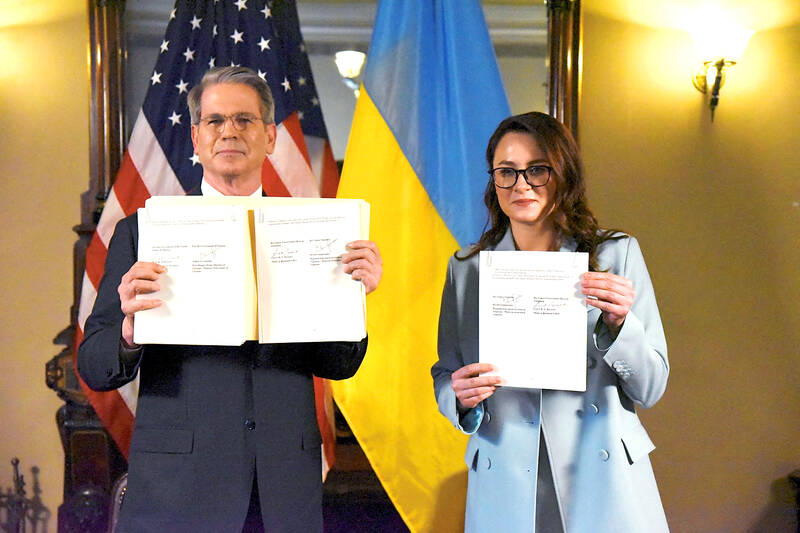The US and Ukraine on Wednesday reached a deal over access to Ukraine’s natural resources, with Ukrainian Minister of Foreign Affairs Andrii Sybiha yesterday hailing it as “an important milestone.”
The deal signed in Washington grants the US privileged access to new investment projects to develop Ukraine’s natural resources, including aluminum, graphite, oil and natural gas.
It has been seen as critical to fostering US President Donald Trump’s goodwill as his administration pushes to end the war with Russia.

Photo: Reuters
“This agreement signals clearly to Russia that the Trump administration is committed to a peace process centered on a free, sovereign and prosperous Ukraine over the long term,” US Secretary of the Treasury Scott Bessent said in a statement. “And to be clear, no state or person who financed or supplied the Russian war machine will be allowed to benefit from the reconstruction of Ukraine.”
Ukrainian Minister of Economic Affairs Yulia Svyrydenko said on social media that “together with the United States, we are creating the Fund that will attract global investment into our country.”
Trump, in a NewsNation “town hall” on Wednesday, said that he told Ukrainian President Volodymyr Zelenskiy when they both attended the funeral of Pope Francis at the Vatican last weekend that “I was telling him that it’s a very good thing if we can produce a deal that you sign.”
Under the terms of the deal, the US would get first claim on profits transferred into a special reconstruction investment fund that would be jointly managed by both nations.
The deal is intended in part to reimburse the US for future military assistance to Ukraine.
“We made a deal where our money is secure, where we can start digging and doing what we have to do,” Trump said at a Cabinet meeting at the White House earlier on Wednesday.
Washington also acknowledged Kyiv’s intentions for the deal to avoid any conflict with its plans to join the EU.
The focus will now shift to the negotiations over a peace deal.
Sybiha discussed the deal with the EU’s top diplomat.
“This marks an important milestone in Ukraine-US strategic partnership aimed at strengthening Ukraine’s economy and security,” Sybiha wrote on X.
He said he had informed European Commission Vice President Kaja Kallas about the deal and that they had discussed moves to “coordinate steps ahead of important international events.”
“We discussed recent diplomatic efforts and the next steps to achieve a fair and lasting peace,” Sybiha said.

CHIP WAR: The new restrictions are expected to cut off China’s access to Taiwan’s technologies, materials and equipment essential to building AI semiconductors Taiwan has blacklisted Huawei Technologies Co (華為) and Semiconductor Manufacturing International Corp (SMIC, 中芯), dealing another major blow to the two companies spearheading China’s efforts to develop cutting-edge artificial intelligence (AI) chip technologies. The Ministry of Economic Affairs’ International Trade Administration has included Huawei, SMIC and several of their subsidiaries in an update of its so-called strategic high-tech commodities entity list, the latest version on its Web site showed on Saturday. It did not publicly announce the change. Other entities on the list include organizations such as the Taliban and al-Qaeda, as well as companies in China, Iran and elsewhere. Local companies need

CRITICISM: It is generally accepted that the Straits Forum is a CCP ‘united front’ platform, and anyone attending should maintain Taiwan’s dignity, the council said The Mainland Affairs Council (MAC) yesterday said it deeply regrets that former president Ma Ying-jeou (馬英九) echoed the Chinese Communist Party’s (CCP) “one China” principle and “united front” tactics by telling the Straits Forum that Taiwanese yearn for both sides of the Taiwan Strait to move toward “peace” and “integration.” The 17th annual Straits Forum yesterday opened in Xiamen, China, and while the Chinese Nationalist Party’s (KMT) local government heads were absent for the first time in 17 years, Ma attended the forum as “former KMT chairperson” and met with Chinese People’s Political Consultative Conference Chairman Wang Huning (王滬寧). Wang

CROSS-STRAIT: The MAC said it barred the Chinese officials from attending an event, because they failed to provide guarantees that Taiwan would be treated with respect The Mainland Affairs Council (MAC) on Friday night defended its decision to bar Chinese officials and tourism representatives from attending a tourism event in Taipei next month, citing the unsafe conditions for Taiwanese in China. The Taipei International Summer Travel Expo, organized by the Taiwan Tourism Exchange Association, is to run from July 18 to 21. China’s Taiwan Affairs Office spokeswoman Zhu Fenglian (朱鳳蓮) on Friday said that representatives from China’s travel industry were excluded from the expo. The Democratic Progressive Party government is obstructing cross-strait tourism exchange in a vain attempt to ignore the mainstream support for peaceful development

ELITE UNIT: President William Lai yesterday praised the National Police Agency’s Special Operations Group after watching it go through assault training and hostage rescue drills The US Navy regularly conducts global war games to develop deterrence strategies against a potential Chinese invasion of Taiwan, aimed at making the nation “a very difficult target to take,” US Acting Chief of Naval Operations James Kilby said on Wednesday. Testifying before the US House of Representatives Armed Services Committee, Kilby said the navy has studied the issue extensively, including routine simulations at the Naval War College. The navy is focused on five key areas: long-range strike capabilities; countering China’s command, control, communications, computers, cyber, intelligence, surveillance, reconnaissance and targeting; terminal ship defense; contested logistics; and nontraditional maritime denial tactics, Kilby